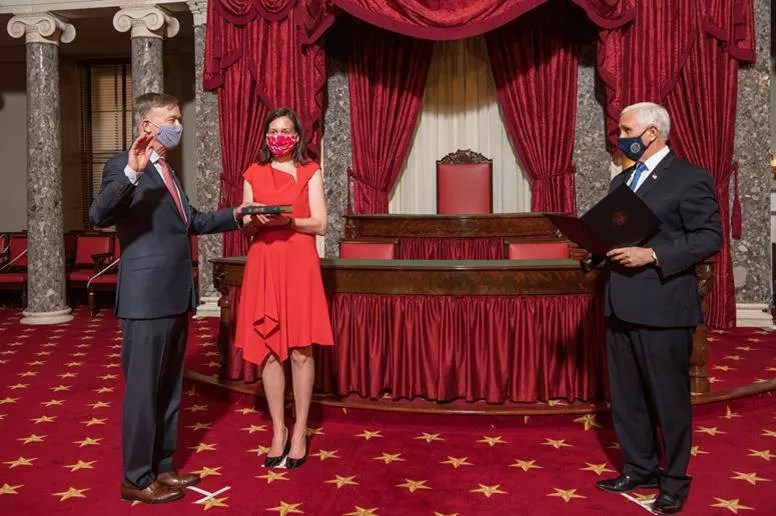
Hickenlooper campaign staff

Audio By Carbonatix
John Hickenlooper was sworn in as Colorado’s newest senator on Sunday, taking the oath of office by placing his left hand on a Bible and raising his right into the air – the same two hands that have held an innumerable number of pint glasses over the decades. That’s because before Hickenlooper was an elected representative of the Democratic party (as Denver mayor, Colorado governor and now U.S. senator), he was the self-appointed head of the party hearty, leading the Wynkoop Brewing Company to its own high office in LoDo.
And while his story has been told many times, and very candidly, in his autobiography, The Opposite of Woe, it’s worth remembering some of Hickenlooper’s beery highlights, accomplishments and trivia. Since this is 2021, here are 21 beery facts about our new man in Washington, D.C.
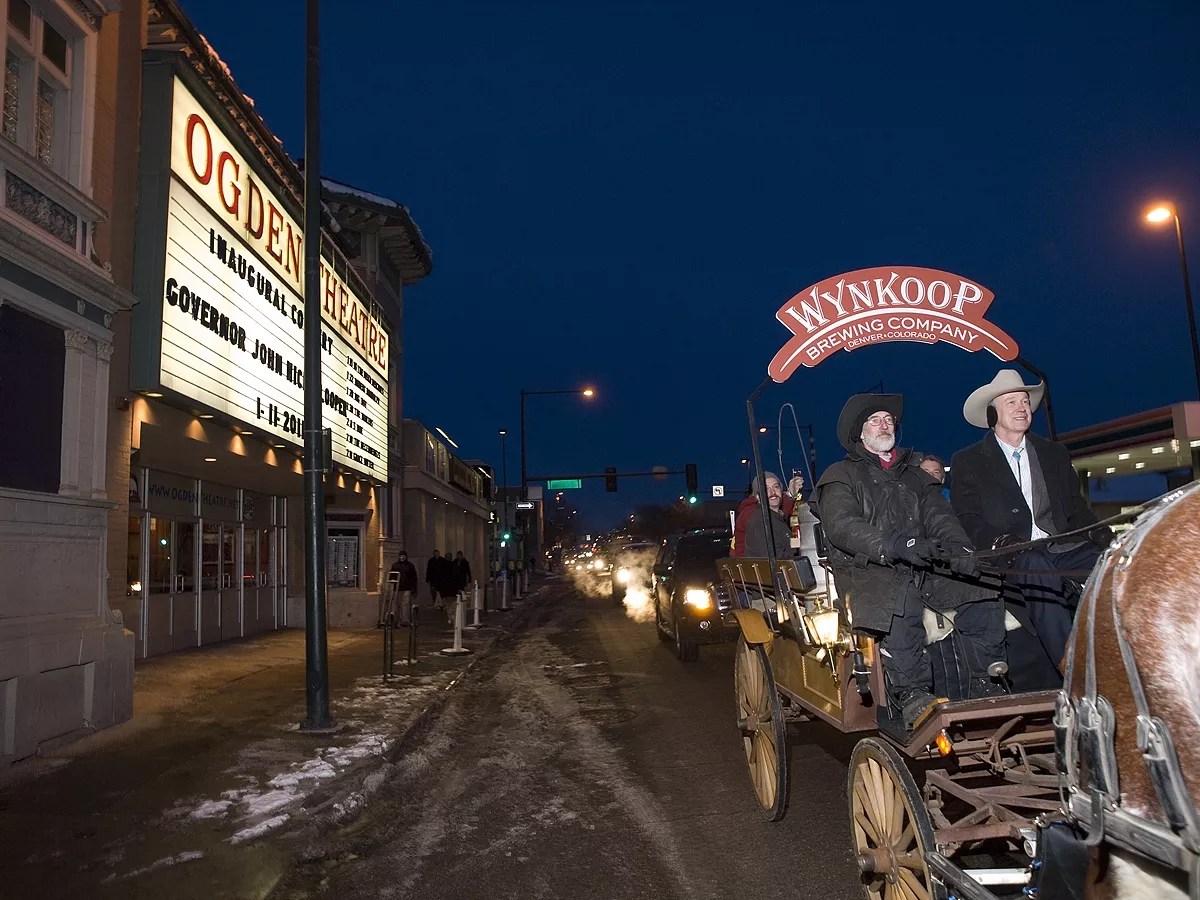
Hickenlooper rode a horse and carriage to his gubernatorial inauguration in 2011.
Mark Manger
1. For his first gubernatorial inauguration in January 2001, Hickenlooper climbed aboard a horse and carriage that the Wynkoop had been using to deliver kegs to bars around town (a fun marketing effort at the time). He then rode from a Blockbuster parking lot to the front doors of the Fillmore Auditorium. And although Hickenlooper had long since sold his shares of the brewery, the Wynkoop made a special beer for the occasion, Inaugurale, which had been loaded into the cart as well – and delivered to the party that night.
2. Three years later, Hickenlooper installed the first-ever craft-beer draft system in a governor’s mansion. Located in the first-floor parlor, the three-tap system still serves a rotating selection of local beers. Hickenlooper told Westword that he got the idea for the bar about a year earlier, and went into the basement to see if it would be possible to put a cooler down there to hold kegs. It was, and that cooler is now located inside a basement closet. The draft lines extend from there through the ceiling to the bar.
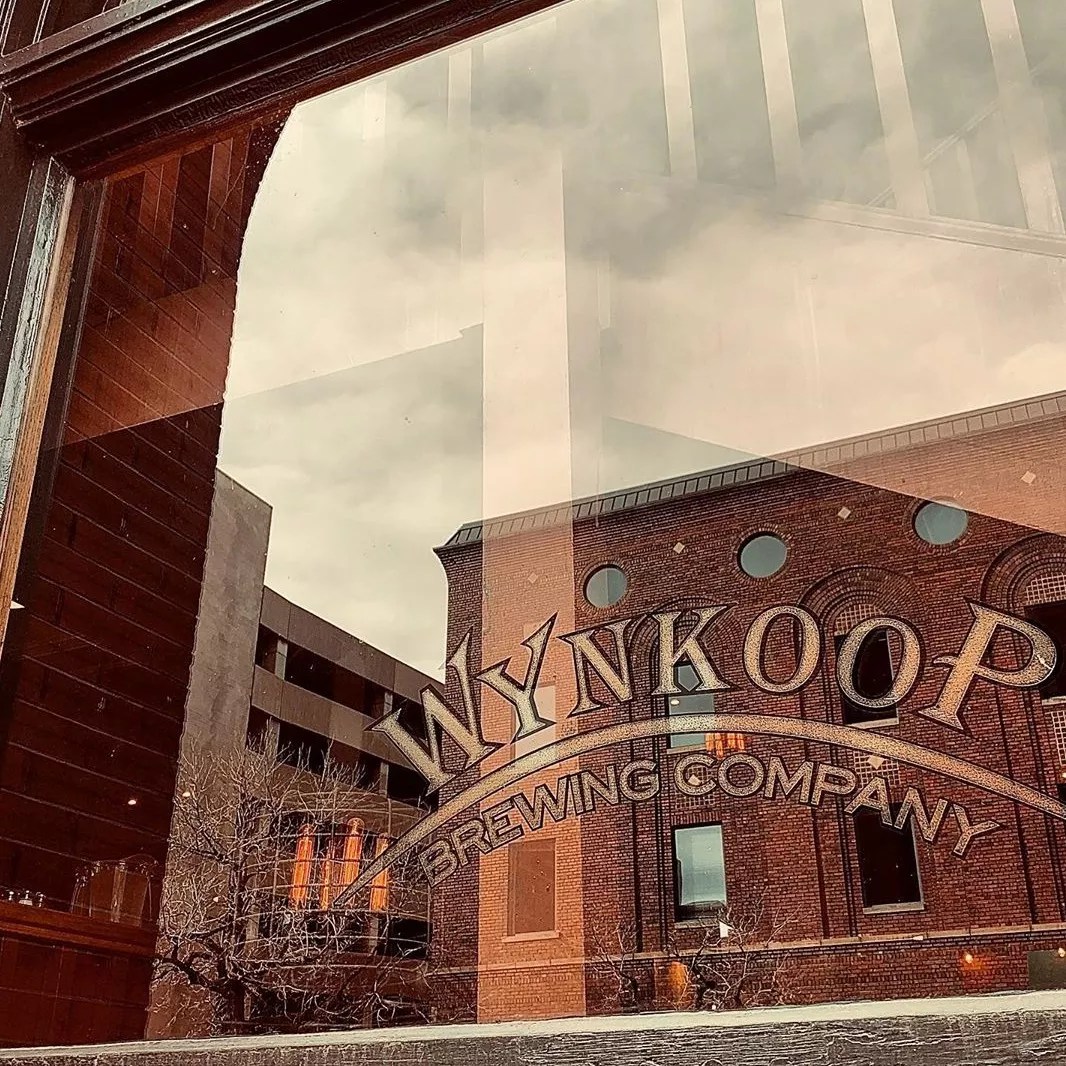
Wynkoop Brewing Company
3. The Wynkoop is Colorado’s oldest brewpub, but it almost wasn’t. The owners of Carvers Brewing in Durango almost beat Hickenlooper to the punch in 1988, but they decided to spend the summer rafting instead. Meanwhile, the would-be owners of the Denver Brewing Company were trying to open a brewery at 15th and Market streets. That project had been in the works for several years, but was never able to raise enough money to open.
4. By the time Prohibition ended in 1933, only one brewery – Tivoli Brewing – had managed to stay in business over the previous eighteen years. Before Prohibition, there were several ale makers in Denver, but Tivoli primarily focused on lagers before eventually closing in 1969. So when the Wynkoop opened in 1988, it became the first brewery to produce ales in the Mile High City in a very long time.
5. Always the marketing savant, Hickenlooper told Denver Post columnist Dick Kreck that he planned to sell beer on the Wynkoop’s opening day, October 18,1988, at the pre-Prohibition price of 25 cents a cup. The tactic worked, attracting every newspaper and TV station in town – along with then-Mayor Federico Peña. A line formed around the block, and the Wynkoop ended up selling 6,000 cups of beer that day.
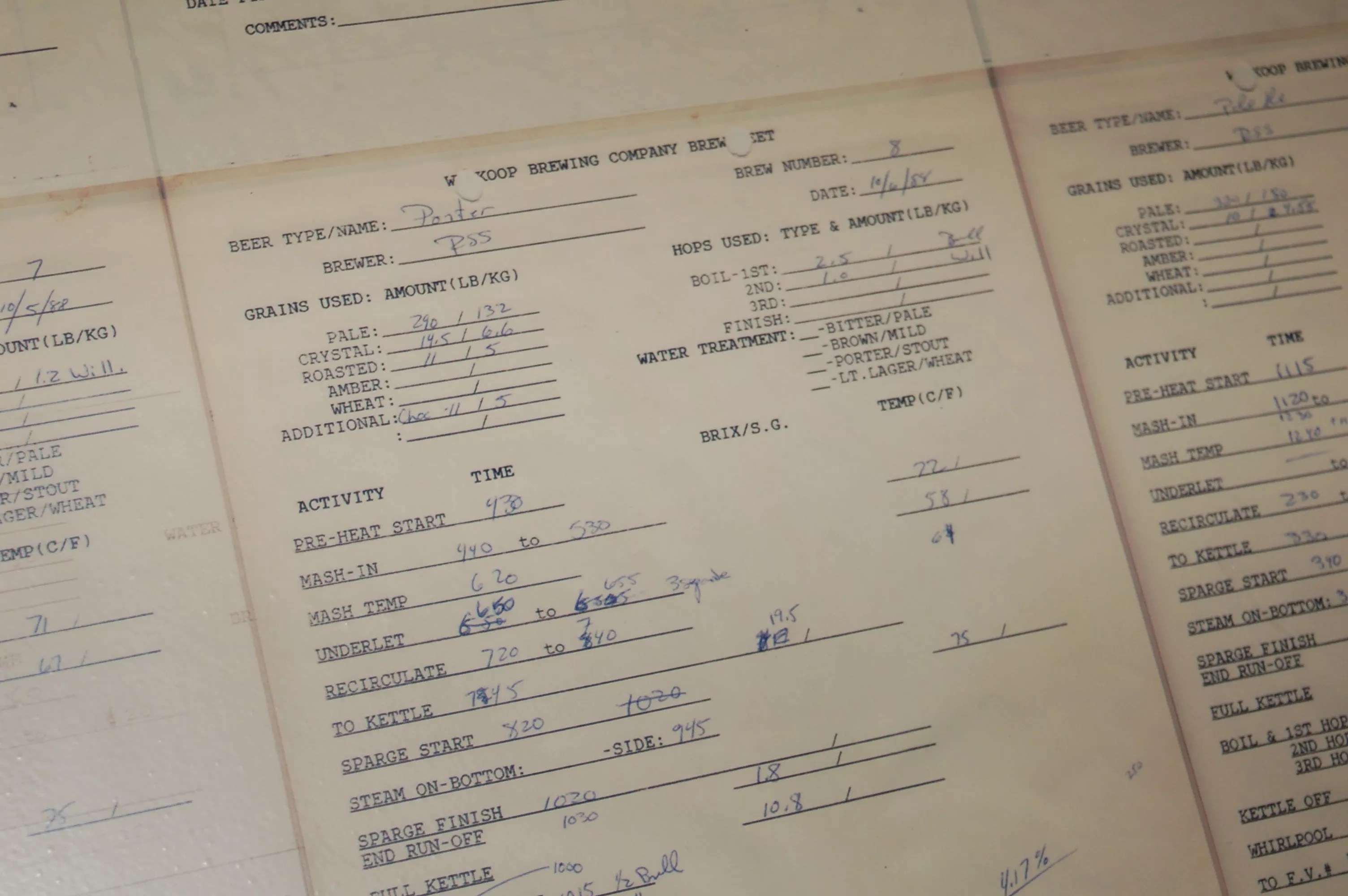
Brew sheets adorn the walls of the Wynkoop.
Jonathan Shikes
6. Although he learned how to home-brew in college, Hickenlooper never brewed the beer at the Wynkoop, leaving that to the pros he hired, including Russell Schehrer, Tom Dargen and Kyle Karstens. Hundreds of old brew sheets now decorate the walls at the Wynkoop, each one initialed by the brewer.
7. The Wynkoop’s first brewer was Russell Schehrer, a master home brewer, computer programmer, painter and eccentric. He had won the Homebrewer of the Year Award in 1985 from the American Homebrewers Association, so when Hickenlooper went looking for a head brewer, the AHA’s Charlie Papazian recommended him. At first, Schehrer would only brew English-style cask ales (warm and flat), but Hickenlooper eventually convinced him to make something cold and carbonated. Schehrer eventually left the brewery in the mid-1990s, and died in 1996 at the age of 38, but he has been memorialized by the Brewers Association (also founded by Papazian) with the Russell Schehrer Award for Innovation in Craft Brewing; he is often cited as being among the first modern U.S. microbrewers to make mead, cider, doppel alt, cream stout and chili beer.
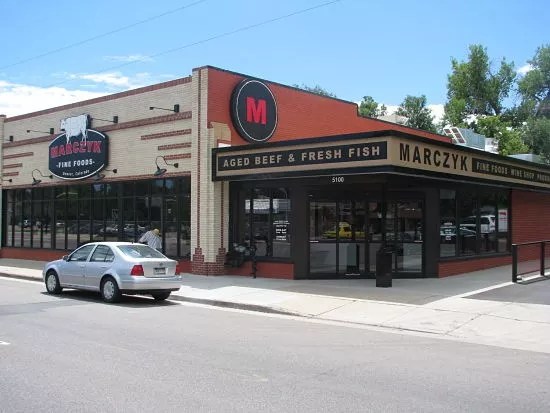
Marczyk Fine Foods.
Westword file photo
8. At the time, Russ Scherer was married to Barbara Macfarlane, and the two were original investors in the Wynkoop. Macfarlane would go on to co-found Marczyk Fine Foods in 2002 with husband Pete Marczyk. Their three locations have become much-loved upscale grocery stores.
9. It took a while for Hick and his fellow co-founders to find the right space in Denver, but when they did, they hit a home run. The gorgeous five-story J.S. Brown Mercantile Building, built in 1899 as a wholesale grocery warehouse, has ornate arched windows, pressed tin ceilings and sandstone trim. And at the time, it was located in one of the most run-down parts of the city, so Hickenlooper was able to lease 11,600 square feet for a paltry $1 per square foot. But building owner Jack Barton believed in the Wynkoop and wanted the building to be used. Today, of course, it’s a stone’s throw from Coors Field and in the heart of booming LoDo.
10. The Wynkoop remained the only brewpub in Denver for three years, but by 1991, two other beer makers, Rock Bottom Brewing and Champion Brewing, had opened their doors. Ever the competitor, Hickenlooper bought his building that year from Barton and converted the second story into a pool hall. He later renovated the remaining three stories into condos, living in one of them himself.
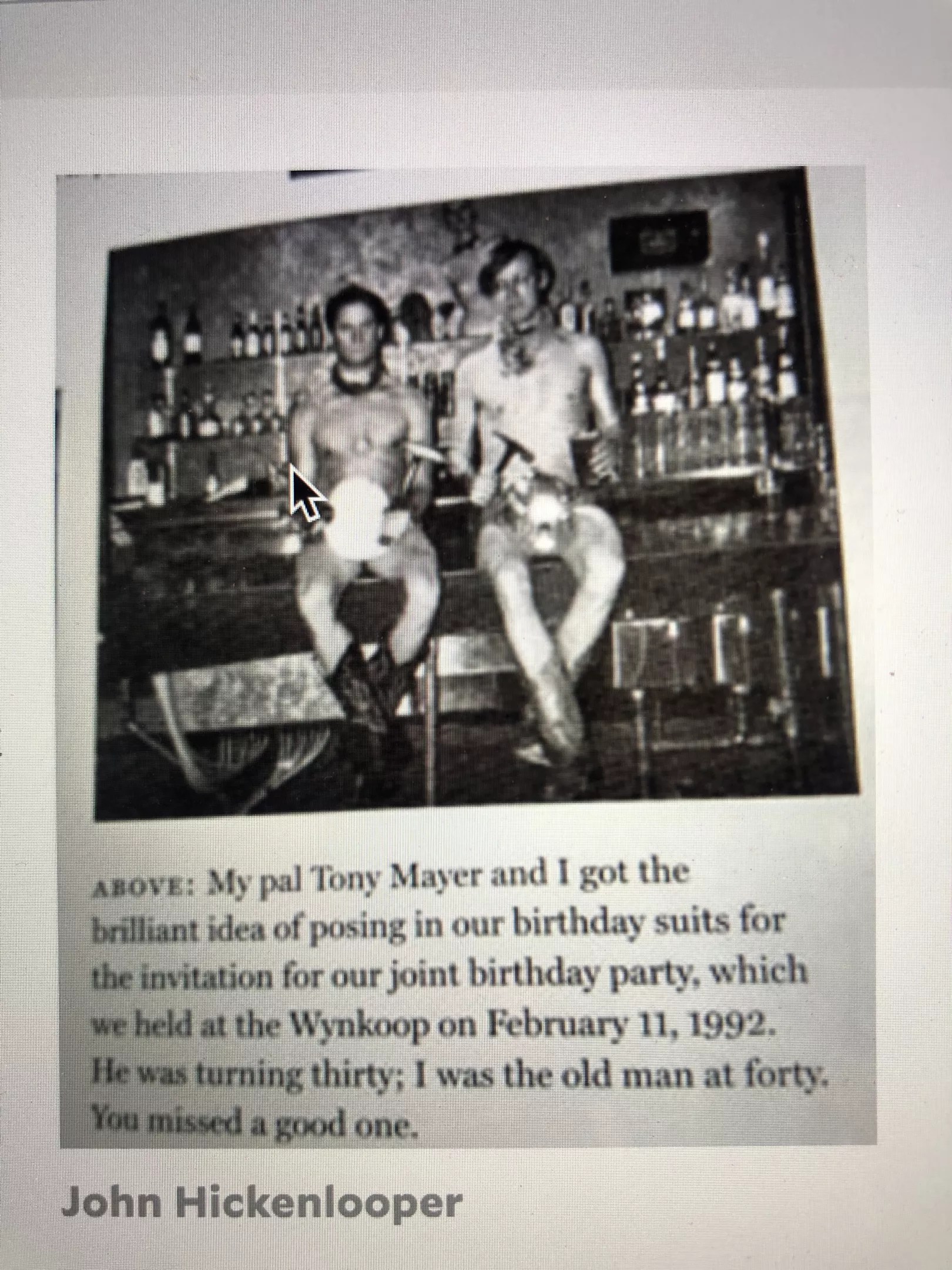
Aa photo of a page in Hickenlooper’s autobiography in which he talks about the birthday invite.
Jonathan Shikes
11. For his fortieth birthday, in 1992, Hickenlooper sent out invitations with a photo of him and a friend sitting on the Wynkoop’s bar wearing nothing but bandannas, boots, serious expressions and well-placed miner’s hats.
12. In the early years, the Wynkoop celebrated its anniversary with a pig roast, and for the third anniversary, Hickenlooper came up with the idea to race pigs down the alley behind the brewpub. The Running of the Pigs – or “Pamplona on the Platte,” as it was nicknamed – got a lot of media play and sold a lot of beer, but it also got the attention of People for the Ethical Treatment of Animals. After that, Hickenlooper changed the name to the parade of pigs and got people to pamper the animals. Ska Brewing’s Dave Thibodeau, a vegan, won the contest in the event’s final year before Hickenlooper turned the day into a fundraiser for prairie dogs instead. For that, guests drank Prairie Pup Pale Ale and received “I Saved a Prairie Dog at the Wynkoop Brewing Co.” pint glasses.

This screen capture is from a film by Gabriel Dohrn of Denver Film Company about Hick’s presidential run.
Denver Film Company
13. Hickenlooper loved to give public tours of the brewery – and they were legendary. As former brewer Tom Dargen told me for my book Denver Beer: A History of Mile High Brewing, Hickenlooper loved to tell off-color jokes. “There was one about the Hiney Lick Maneuver and another about a one-armed man counting his change involving John putting his finger through his open fly to point out the coins in his hand. And then there was the way that Hickenlooper explained why brewers have to keep their process sanitary when using yeast. ‘It’s kind of like an orgy,’ he would tell any random group of grandmothers. ‘You don’t want any uninvited guests.'”
14. Just a year after opening the Wynkoop, Hickenlooper was popped for a DUI. Here’s how he describes what happened in his autobiography. “In 1989, something not so great happened. On my way home from an employee’s birthday party, I was arrested for drinking and driving. I didn’t fight the charge of ‘driving while impaired.’ I did what I did and it was stupid and dangerous. I could have killed myself, or worse, someone else. I did my community service, but also changed the way the Wynkoop did business. We became the first restaurant in Colorado to offer a designated-driver program.”
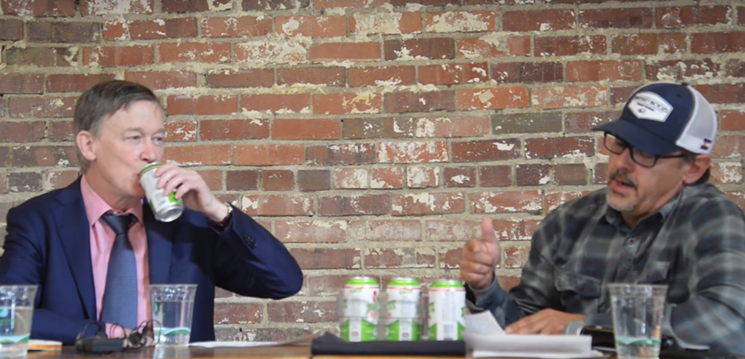
The Post Brewing Company
15. Hickenlooper is usually credited for originating Colorado’s beery nickname, “The Napa Valley of Craft Beer” – and he likes to refer to our state that way whenever he can.
16. In addition to the Wynkoop, Hickenlooper co-founded Phantom Canyon Brewing in Colorado Springs (where he also bought and renovated the historic building where it is located) and Coopersmith’s Pub & Brewery in Fort Collins along with Brad Page and Scott Smith. Both breweries still exist.
17. He also co-founded, invested in or consulted on at least a dozen other brewpubs nationwide in the 1990s, including in Nebraska, Iowa, Wyoming, South Dakota, Kansas, Wisconsin, West Virginia, Kentucky and San Francisco. Most of these have since closed.
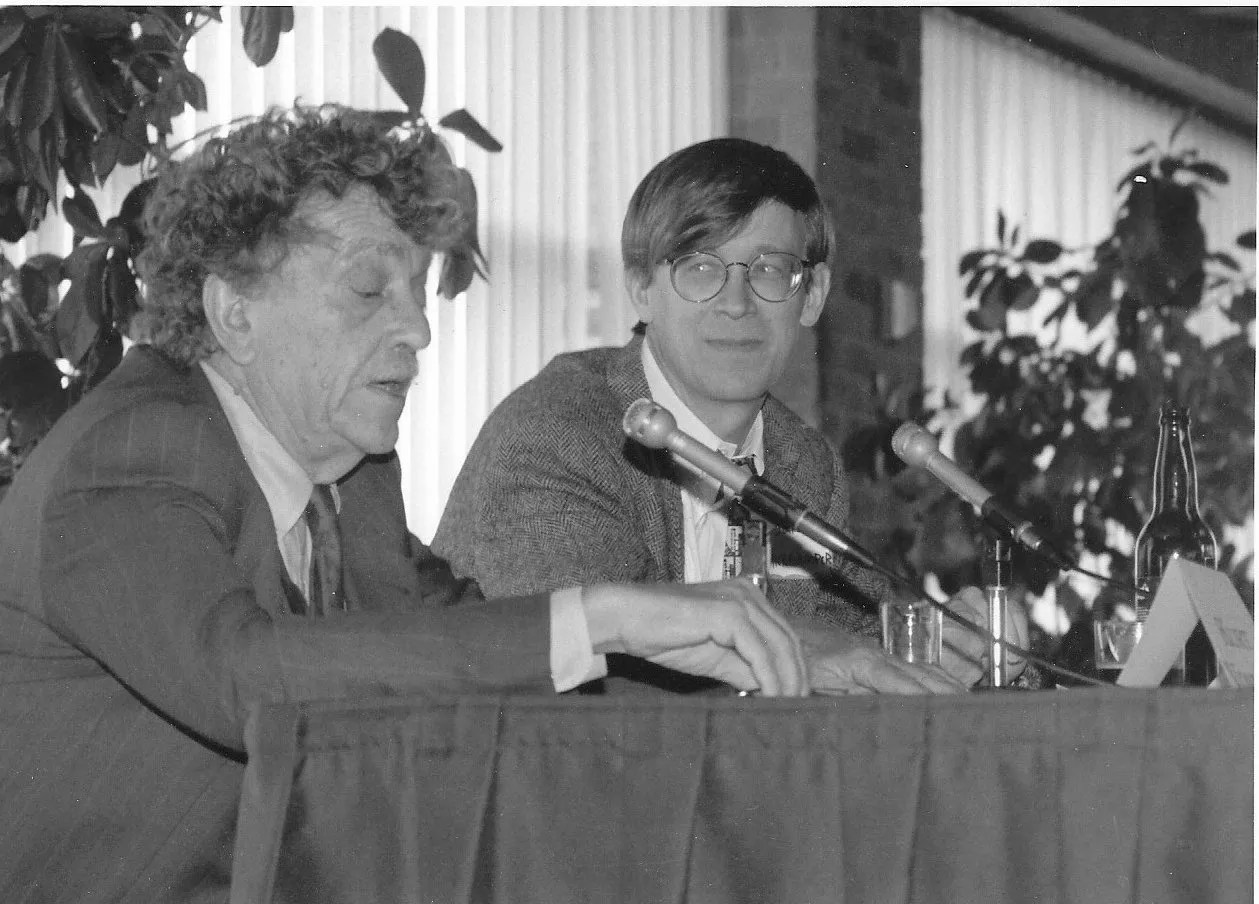
Hickenlooper was friends with Kurt Vonnegut.
Hickenlooper’s Twitter feed
18. In the 1990s, Hickenlooper became friends with Kurt Vonnegut, the famed author of books like Slaughterhouse-Five and Breakfast of Champions, after the two met at an art show in Denver and Vonnegut realized he’d been fraternity brothers with Hickenlooper’s father. Not only that, but Vonnegut’s grandfather had owned a brewery in Indiana in the late 1800s. The author eventually gave Hickenlooper one of his family recipes, which the brewery turned into Kurt’s Mile High Malt. Wynkoop continued to brew the beer periodically long after Vonnegut had died in 2007 and Hickenlooper had moved on to higher office.
19. Although he will happily indulge in an IPA, heavily hopped brews aren’t really Hick’s jam. He prefers the maltier pleasures of English-style ales like the ones the Wynkoop originally served. He also likes lower-ABV amber ales.

This beer label sadly never saw the light of day.
The Post Brewing Company
20. Oddly, Hickenlooper had never had a beer named after him – something that is especially interesting considering his long career in brewing and his unusual surname – until 2019. And it didn’t go well. The Post Brewing, founded by the Big Red F’s Dave Query, trademarked Hickenlooper American Ale that year and brewed a batch in honor of the outgoing governor and incoming presidential candidate; Query and Hick had been friends in the restaurant industry. But an anti-fracking group, angry about Hickenlooper’s record on the subject, began boycotting the Post as a result. In the end, the brewery pulled the plug on the beer as well.
21. When Hickenlooper was elected mayor of Denver in 2003, he put his ownership of the Wynkoop and numerous restaurant properties into a blind trust that was managed by the brewery’s other investors. Eventually, though, the investors cashed him out – and Hickenlooper pocketed $5.8 million. But an investigation by the Colorado Independent showed that he also gave a lot of it away. In fact, between 1986 and 2010, Hick made more than $16 million, but he also donated $3 million to various charitable causes.